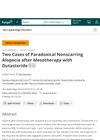TLDR Dutasteride can stabilize hair loss in patients with frontal fibrosing alopecia, but its safety in women is unclear, so use it with caution.
The study titled "Effectiveness of dutasteride in a large series of patients with frontal fibrosing alopecia in real clinical practice" by Pindado-Ortega et al. examined the use of dutasteride, a 5-alpha-reductase inhibitor (5ARI), in the treatment of frontal fibrosing alopecia (FFA). The study found that dutasteride led to statistically significant disease stabilization in patients with FFA, particularly in the frontal and bilateral temporal aspects of the hairlines. The drug was well tolerated by the patients. The exact mechanism of action of 5ARI in FFA is not well understood, but it may help prevent hair miniaturization in androgen-sensitive scalp areas, leading to disease stabilization. However, the evidence for the effectiveness of 5ARI in FFA is limited to retrospective cohort studies, and the safety profile of the drug in women is still lacking. Therefore, caution should be exercised when prescribing dutasteride until more robust evidence is available. Nonetheless, dutasteride may be a beneficial treatment option for patients who cannot tolerate or have not responded to other systemic agents.
21 citations
,
March 2018 in “JEADV. Journal of the European Academy of Dermatology and Venereology/Journal of the European Academy of Dermatology and Venereology” 5-alpha-reductase inhibitors may help stabilize or slow down hair loss in some frontal fibrosing alopecia patients, but more research is needed to confirm their effectiveness and safety.
220 citations
,
June 2013 in “The Journal of Pathology” Lichen planopilaris may be an autoimmune disease causing hair loss due to immune system issues in hair follicles.
 August 2021 in “Skin appendage disorders”
August 2021 in “Skin appendage disorders” Two people lost hair unexpectedly after getting a common hair loss treatment with a drug called Dutasteride.
1 citations
,
June 2021 in “Singapore Medical Journal” Dutasteride and finasteride can help increase hair growth gene expression but need further improvement.
3 citations
,
May 2020 in “Journal of The Korean Medical Association” Minoxidil and finasteride are effective for treating hair loss, with dutasteride showing potential but with side effects.
 33 citations
,
August 2016 in “Indian Journal of Dermatology, Venereology and Leprology”
33 citations
,
August 2016 in “Indian Journal of Dermatology, Venereology and Leprology” Dutasteride is more effective than finasteride at increasing hair count and reversing hair thinning in men with hair loss, but both have similar side effects.
 6 citations
,
April 2016 in “PubMed”
6 citations
,
April 2016 in “PubMed” The review found that women using hair loss drugs like finasteride and dutasteride rarely reported sexual side effects.
 97 citations
,
January 2014 in “Journal of The American Academy of Dermatology”
97 citations
,
January 2014 in “Journal of The American Academy of Dermatology” Dutasteride 0.5 mg works better than finasteride and placebo for increasing hair in men with hair loss.
January 2014 in “프로그램북(구 초록집)” 5AR inhibitors like finasteride and dutasteride improve hair growth and slow hair loss in male pattern baldness.
 100 citations
,
April 2010 in “Expert Opinion on Pharmacotherapy”
100 citations
,
April 2010 in “Expert Opinion on Pharmacotherapy” Hair loss in men treated best with early medication or transplant, new treatments researched.
 215 citations
,
November 2006 in “Journal of The American Academy of Dermatology”
215 citations
,
November 2006 in “Journal of The American Academy of Dermatology” Dutasteride more effective for hair growth, but has more side effects than finasteride.
 33 citations
,
October 2005 in “PubMed”
33 citations
,
October 2005 in “PubMed” Dutasteride successfully treated a woman's hair loss when other treatments failed.









